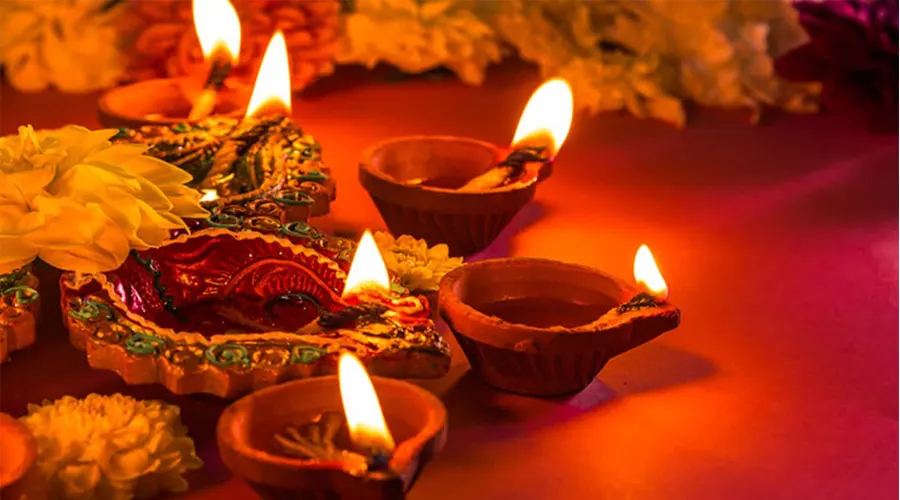Diwali 2023 dates: When is Diwali? | Diwali Calendar 2023 - The 5 days of Diwali 2023 | History of Diwali
Deepawali or Diwali is the festival of lights and is one of the most celebrated festivals of the year. As described in the Hindu epic Ramayana, this is the day Lord Rama, Goddess Sita, and Lord Lakshmana returned to Ayodhya after spending 14 years in the forest.
In addition to this, it is also believed that Goddess Lakshmi was born during the churning of the cosmic ocean (Samudra Manthan) on this day. Therefore, Goddess Lakshmi is the most significant deity during Diwali Puja.
When is Diwali in 2023?
As per the Hindu calendar, Diwali is observed on Amavasya, the 15th day of the month of Kartik, every year. As part of the Deepavali Puja or Lakshmi Ganesh Pujan, Goddess Lakshmi and Lord Ganesha are worshipped on this day.
This year Diwali will be celebrated on November 12 all over the country. Lakshmi Puja Muhurat - 06:11 PM to 08:15 PM.
The Amavasya tithi begins at 02:44 PM on Nov 12, 2023.
The Amavasya tithi ends at 02:56 PM on Nov 13, 2023.
What are the Diwali dates in 2023?
The 2023 Diwali celebration starts with Dhanteras on Friday, November 10, 2023, and ends with Bhai Dooj on November 15, 2023, Wednesday. Lakshmi Puja, the most auspicious of Diwali festival days is celebrated as the day of Diwali. Hence, Diwali 2023 falls on Sunday, November 12.
Diwali Calendar 2023 - The 5 days of Diwali 2023
| Day 1 | Dhanteras | November 10, Friday |
| Day 2 | Naraka Chaturdasi (Chotti Diwali) | November 12, Sunday |
| Day 3 | Lakshmi Puja (Diwali Festival) | November 12, Sunday |
| Day 4 | Govardhan Puja | November 14, Tuesday |
| Day 5 | Bhai Dooj | November 15, Wednesday |
Diwali illuminates our houses and hearts and preaches the message of friendship and togetherness. Light is the depiction of hope, success, knowledge, and fortune and Diwali reinforces our faith in these virtues of life.
The Story Behind Diwali
Since Diwali is the resemblance of everything that is 'good', this festival has been the center of many mythological stories.
Lord Rama returned to Ayodhya on this day along with Sita and Lakshman after he attained victory over Ravana, the ten-headed demon king of Lanka. On this occasion, the local people lit earthen lamps and burst crackers to welcome their King and queen back to the throne.
This day is also celebrated as the union of Goddess Lakshmi and Lord Vishnu in heaven.
In Bengal, this day is celebrated to worship the most powerful Goddess of 'shakti' - Devi Kali.
In the Jain culture, this day is of utmost importance as Mahavira attained the final 'nirvana' on this day.
In ancient India, this day was celebrated as the harvest festival.
Diwali also marks the death anniversary of Dayanand Saraswati, the 'hero' of the Arya Samaj.
History of Diwali
The origins of Diwali can be traced back to ancient Hindu mythology. According to legend, Lord Rama, the seventh incarnation of Lord Vishnu, returned to his kingdom of Ayodhya after defeating the demon king Ravana.
The people of Ayodhya welcomed Lord Rama by lighting diyas (earthen lamps) and decorating their houses with rangolis (colored patterns). This event is believed to have occurred on the day of Amavasya (new moon day) in the Hindu month of Kartik, which is why Diwali is celebrated during this time.
Traditions and Customs of Diwali
Diwali is a five-day festival, with each day having its own significance and rituals. The first day of Diwali is called Dhanteras, which is considered an auspicious day for buying gold, silver, and other items.
On the second day, Naraka Chaturdashi, people take an early morning bath and light diyas to ward off evil spirits.
The third day is the main day of Diwali, when people wear new clothes, decorate their houses with rangolis and lights, and offer prayers to Goddess Lakshmi, the goddess of wealth and prosperity.
The fourth day is Govardhan Puja, which is celebrated in honor of Lord Krishna. On this day, people make small mounds of cow dung, which represent the Govardhan mountain, and offer prayers.
The fifth day is called Bhai Dooj, which is dedicated to the bond between brothers and sisters.
Another important custom of Diwali is bursting firecrackers. While this tradition is popular among children and adults alike, it has come under scrutiny in recent years due to its harmful impact on the environment and air quality. Some people have started advocating for a more eco-friendly Diwali, which includes celebrating with diyas and lights instead of firecrackers.
In Southern India, Diwali marks the homecoming of their ancient King Mahabali and people decorate their houses with flowers and cow dung to welcome the King. Govardhan Puja is done on this day.
In Bengal and other parts of Eastern India, Goddess Kali is worshipped on this day. This is known as Shyama puja.
In Maharashtra, Diwali starts with the worshipping of cows and their calves. This is known as Vasu Baras.
Big Diwali fairs are held across the country. These fairs are centers of business and many artists and acrobats are seen performing at these events.
Significance of Diwali
Diwali is not only a festival of lights, but it also has great cultural and spiritual significance. The festival symbolizes the victory of good over evil, light over darkness, and knowledge over ignorance.
The lighting of diyas is believed to represent the inner light that protects us from spiritual darkness. It is also a time for families and friends to come together, share sweets and delicacies, and exchange gifts.
In addition to being celebrated by Hindus, Diwali is also observed by Jains, Sikhs, and Buddhists.


Comments (0)